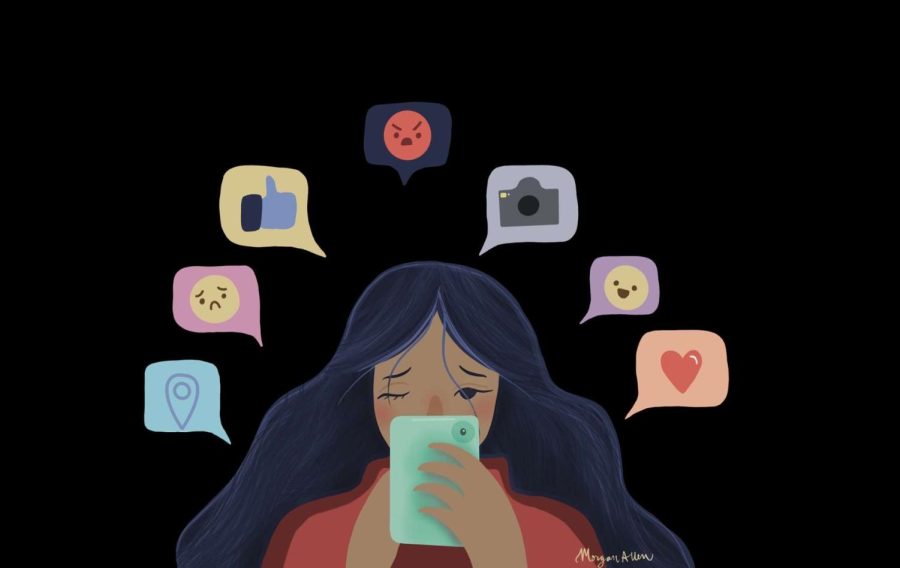FOMO
April 20, 2022
Diving into the lake or watching the sunset, the summer season is right around the corner. With that comes an abundance of fun and excitement, though for some, the pressure to do it all can be overwhelming.
The fear of missing out, also known as FOMO, is a commonly used expression for people who like to be out and about and experience everything life has to offer. However, when an individual is unable to do certain activities, it can leave an anxious feeling.
“I believe this ancient feeling of missing out has been prevalent for many generations,” Jenney Myler, a counselor at Nixa High School said. “I believe as humans we all want to be accepted and included.”
Especially with social media, it’s not uncommon for students to feel left out when they see friends or relatives having fun.
“I do believe that social media has created a heightened awareness of missing out for some people,” Myler said. “Seeing friends posting their activities could make others feel like they are missing out on something better than what they are experiencing in their present moment.”
Although the feeling of missing out is normal, sometimes it can escalate to where it can become unhealthy and socially draining.
“[This can] cause feelings of jealousy or not feeling accepted or included, which could be harmful to one’s mental health,” Myler said.
In some aspects, the fear of missing out can also cause an individual to make bad choices in order to try and feel involved.
“I believe [choice making] depends on the circumstance and the individual,” Myler said. “Life will provide many opportunities for us to make choices and sometimes those choices aren’t the best for us, but could provide a learning opportunity to make a better choice later on.”
Though, Myler can see some benefits of this fear.
“Sometimes it is helpful to see others socializing and being involved because it reminds us of the opportunities to include ourselves and to be active,” Myler said.
This feeling of missing out and wanting inclusion is no stranger to high school students.
“FOMO is [very] prevalent in this generation of students,” junior Jaylin Herbst said. “Everyone wants to feel included and be involved with their friends [and] peers,” Herbst said.
Herbst has her own relationship with FOMO, and feels its effects and emotions in different and personal ways.
“I don’t experience FOMO all of the time, but I typically do when I am trying to go to sleep,” Herbst said. “It often keeps me awake because I feel like I’ll miss something when I am asleep that I would like to be awake for.”
The mind will often make individuals believe that they’re going to miss something if they are not active or present with their peers and their activities.
“I think FOMO could be beneficial to mental health because it could keep you in activities, clubs, or groups to avoid missing out on those things. There you could meet people, learn new things, and give you things to do,” Herbst said. “However, FOMO could be harmful to mental health if people allow fear to become too big of a factor in their lives. This could make people miss out on rest or do something that they don’t actually have the desire to do.”
Another prevalent part of FOMO is the potential for the increase of peer pressure in groups of friends and relationships. Oftentimes, people will go to activities even if they don’t want to.
“FOMO is tied in with peer pressure because people are more likely to give in to something their peers want them to do if they are experiencing this fear of missing out,” Herbst said. “By doing something your peers do, you won’t be missing out on what your age group is doing and you will better fit in with them.”
Social media — more specifically seeing friends hanging out — can cause this peer pressure to occur.
“There are moments when I see social media post from friends or coworkers that are on vacation or somewhere beautiful,” Myler said. “It definitely makes me want to be there as well, especially if I’m not doing much at that time.”
However, for some, the need to be with friends while they’re doing something exciting is less bearing than others.
“I think FOMO is more harmful than beneficial,” junior Matthew VanHorn said. “I don’t believe I suffer [with] FOMO mostly… I would assume it would feel pretty bad.”
VanHorn believes that FOMO can cause negative emotions in an individual.
“Almost everything can cause students to make bad choices, however I do think FOMO can cause students to make even worse choices,” VanHorn said. “[This can cause] depression [and] anxiety for the negatives and I [can’t] really think [of] any positives [that] would come out of the fear of missing out.”
Some emotions can be tied to certain times or seasons of the year. VanHorn suspects that FOMO can behave in a similar way.
“FOMO is probably highest at public events and the holiday seasons,” VanHorn said. “It has a stereotype of [revolving around] having large parties and [getting] together.”
Although there might be more negatives than positives tied to FOMO, it doesn’t mean a person can’t balance having fun with their friends and focusing on themselves.
“To combat FOMO in order to live a fulfilling life without the need of overextension of oneself, you could recognize that not being present at everything is OK,” Herbst said. “Avoid social media apps where you might see something you don’t want to miss out on or do what you know you want to do without getting ideas from others.”
It’s important to focus on oneself in order to understand what an individual wants and needs.
“I believe when we start to feel FOMO, this would be an opportunity to change our focus,” Myler said. “Rather than focusing on what we are missing out on, try noticing what we have. This could be done in several ways, look around your space and at that moment take note of what in your environment brings you peace and happiness.”
Happiness and peace are individual to a person and can come in many different ways and forms.
“This could be a pet, your favorite space (room), friends, family or maybe it’s your music or favorite show playing,” Myler said. “What could you do differently to feel more included, and at the same time remind yourself of all the ways you are involved?”
Myler believes it’s important to challenge one’s own thoughts.
“You could also make a list of all the things you are doing currently that prove you are making progress towards living the life you desire,” Myler said, “These decisions and choices are the ways in which you are showing up in your own life.”







